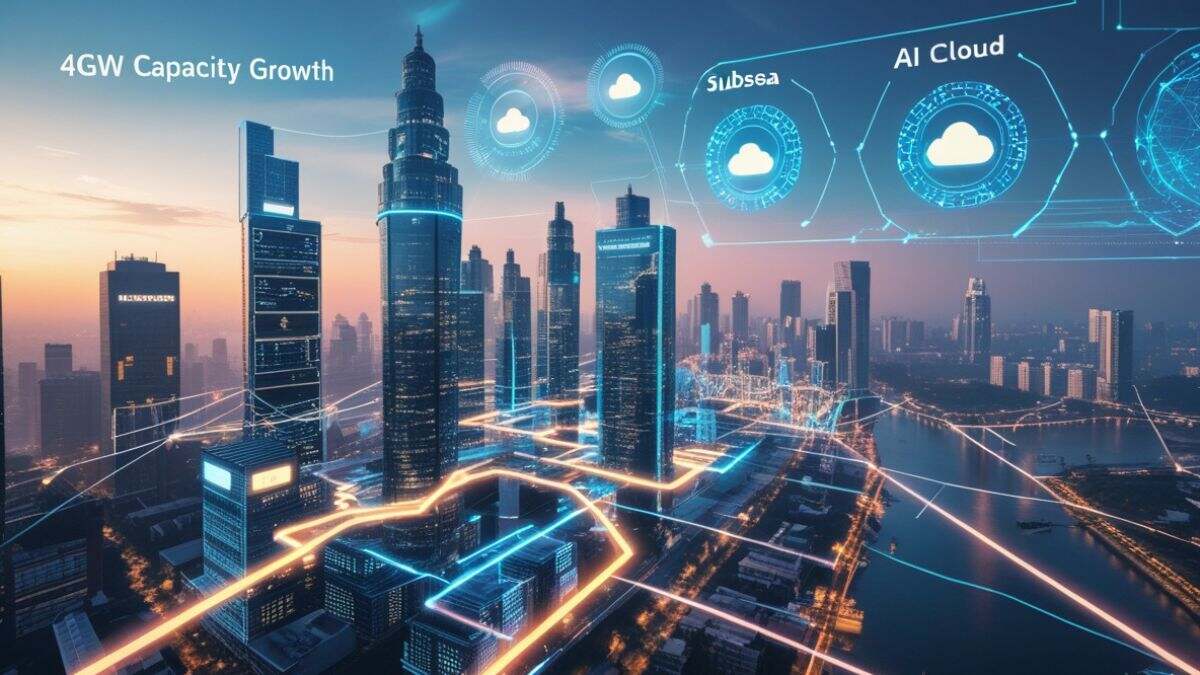Mumbai’s capacity surpassed the 4GW milestone in the first half of 2025, an increase of 14.3% over the same time the previous year.
Mumbai Leads Data Center Growth
According to Knight Frank’s Asia-Pacific Data Centers 2025 study, Mumbai has solidified its status as India’s data center capital, holding 40 percent of the nation’s capacity and 44 percent of its live information technology (IT) capacity.
The city’s capacity increased by 14.3 percent, surpassing the 4 gigawatt (GW) milestone in the first half of 2025. There are now 591 megawatts (MW) in operation, 185 MW under construction, and around 3.2 GW in the works.
“Mumbai is drawing consistent international investment with more than 3GW of capacity in the works and robust governmental backing for green data center parks,” said Shishir Baijal, managing director and chairman of Knight Frank India.
Rising Demand Tightens Supply
Demand has kept up with the strong increase. In contrast to India’s average rate of 12.3 percent, Mumbai reported 97.6MW of take-up in the six months leading up to June, leaving vacancy at a tight 5.4 percent.
Cloud usage, data localization needs, and the expansion of financial technology (fintech) and banking, financial services, and insurance (BFSI) companies are the main causes of the spike.
In Mumbai, two-thirds of the capacity that is now being built has already been pre-leased. According to the research, the industry faces short-term supply issues for higher demand since there are only three active locations that can sustain hyperscale installations of more than 2.5MW.
Global Players Eye Mumbai
In a market that has historically been controlled by local companies, this atmosphere is making it possible for international businesses and joint ventures to construct high-capacity facilities. Blackstone-Panchshil Realty’s 500MW AI complex and Nippon Telegraph and Telephone’s (NTT) 500MW NAV2 campus are examples of landmark projects.
Mumbai’s distinct advantages—its strong subsea cable connection, scalable power infrastructure, close proximity to business centers, and forward-thinking state policies—are solidifying its status as India’s data center capital as cloud adoption and AI workloads pick up speed, according to Baijal.
Hyderabad Emerges Data Hub
Metros like Chennai, Hyderabad, and Bengaluru are becoming more popular, but they are unable to match Mumbai’s size, speed, and capacity to operate as the entry point for cloud, artificial intelligence (AI), and corporate workloads in South Asia, he added.
With more than 500MW planned, Hyderabad is emerging as a hyperscale-first market.
While NTT announced a 400MW AI-focused campus for Rs 10,500 crore ($1.25 billion), ST Telemedia Global Data Centres (STT GDC) India has partnered with the Telangana government to build a 100MW campus.
With 2.1GW, Hyderabad is now the second-largest data center market in India. Chennai (1.6GW), New Delhi (712MW), and Bengaluru (307MW) are next in line.
Regional background
The Asia-Pacific area announced around 13GW of new projects in the first half of 2025, more than twice as much as the 5GW announced in the same time last year, according to the research.
With Amazon, Microsoft, Google, Amazon Web Services (AWS), and Meta together committing more than $160 billion this year, investment promises already surpass $180 billion.
“The sheer amount of new projects in the area underscores just how significant the region has become in the global digital infrastructure ecosystem,” said Fred Fitzalan, head of data centers Asia-Pacific at Knight Frank.
Asia-Pacific Data Boom
It is difficult to coordinate this quick expansion as operators have to keep up with growing energy demands and technological advancements while making sure new facilities are built in accordance with changing requirements, he added.
With capacity almost tripling to 5.8GW in the last year, Malaysia’s Johor has become the fastest-growing center in Southeast Asia. With 4.2GW, Tokyo is still a major center, but Melbourne is growing quickly while Sydney struggles with electricity and land issues. With significant AI-focused initiatives now under way, Seoul continues to be a desirable destination for investors.

